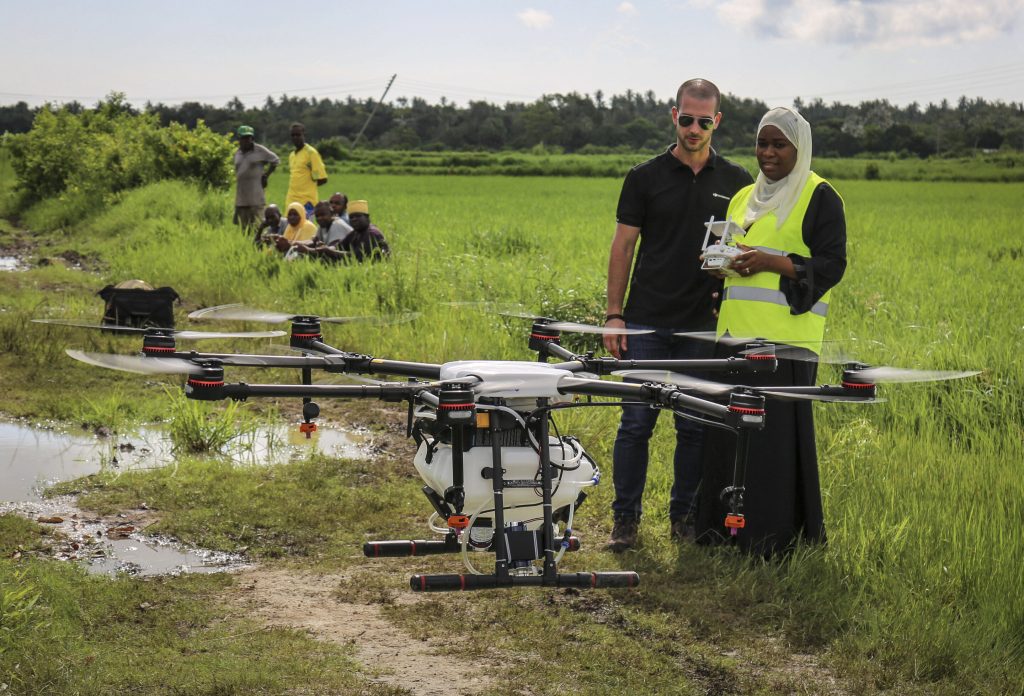In the picturesque Tanzanian archipelago of Zanzibar, drones are on a life-saving mission. Flying over the vast rice paddies, these drones are not capturing breathtaking aerial shots. Still, they are instead on a medical mission to combat malaria, a disease that has plagued the region for decades.
The drones spray a non-toxic solution called Aquatain over stagnant water bodies, which are prime breeding grounds for malaria-carrying mosquitoes. The solution works by preventing mosquitoes from reproducing. “By controlling them right at the source, we hope to have an impact ultimately on the transmission of malaria,” says a local expert. The strategy is simple yet effective: reduce the mosquito population and reduce the spread of the disease.
Malaria’s toll on sub-Saharan Africa is staggering. The World Health Organization reports that over 430,000 people succumb to the disease annually, with children being the most vulnerable. A staggering 90% of these deaths occur in sub-Saharan Africa. In Tanzania alone, malaria claims the lives of 70,000 individuals each year.
At a malaria awards ceremony and press conference held at the African Union Summit 2023, the African Leaders Malaria Alliance (ALMA) received a call to action led by the RBM Partnership to End Malaria urging African and world leaders to do more to protect expectant mothers and babies from malaria.
A book with an open letter and more than 1,000 signatures was handed over to the Executive Secretary of ALMA at a media briefing and malaria awards ceremony at the 2023 African Union Summit.
The letter, which called on decision-makers to prioritize pregnant women and newborns in the response to malaria, included signatures from 43 countries and more than 300 organizations in Africa. Pregnant women and newborns are particularly vulnerable to malaria infection. Unfortunately, they often face gaps in malaria services.
Last year, only one in three eligible pregnant women across sub-Saharan Africa received the entire preventive antimalarial treatment as the World Health Organization recommended.
Also known as IPTp with quality-assured SP, this is a simple and cost-effective solution against malaria that saves the lives of mothers and babies. While uptake has improved in the last decade, coverage has remained low compared to other malaria-control interventions and falls short of global targets.
Zanzibar’s innovative approach to tackling this menace is commendable. Traditional methods of applying chemicals to water bodies are labour-intensive and often inefficient, given the vast areas that need coverage. “As you can see, the way the paddies look, it is thought just to walk through and apply the chemical,” a local official explains.
Drones, on the other hand, can cover large expanses in a short time, making the process efficient and cost-effective. Moreover, using drones is significantly cheaper than deploying helicopters for the same purpose.
To gauge the effectiveness of this approach, scientists have been diligently collecting samples before, during, and after the spraying sessions. The goal is clear: to assess the impact fully and, if successful, replicate this method across Africa. The vision is ambitious – to eliminate malaria, one country at a time.
In the last ten years, Zanzibar, with a population of 1.2 million people, has embarked on different methods of fighting malaria. Thousands of mosquito nets have been distributed to put over beds, and insecticide was supplied to spray in homes. The campaigns have succeeded in decreasing the disease’s prevalence.
According to the malaria elimination program, some areas of Zanzibar have seen the prevalence of malaria drop from 40% of the population to less than 10%. The spraying by drones is a new part of the strategy. Using drones will be essential to efficiently spray the extensive rice fields, which have been identified as malaria hot spots in Zanzibar.
“The drone is efficient because spraying by hand is very time consuming and using a helicopter is too expensive,” said Eduardo Rodriguez of DJI, a Chinese drone manufacturer. With the help of drone pilots from the State University of Zanzibar, the DJI Agras drone is being tested to spray the rice paddies. “The ultimate vision of our fight against malaria is to bring malaria down to zero in 2023 as our target,” added Abdullah Suleiman Ali, manager of the Zanzibar Malaria Elimination Program.
You can also read Tanzania’s Remarkable Progress Towards Zero New HIV Infections by 2030.
The debate on this approach’s recent effectiveness remains ongoing. While the use of drones offers a promising solution, challenges such as drone regulations, the need for trained pilots, and ensuring consistent Aquatine supplies must be addressed.
However, the potential benefits far outweigh these challenges. If Zanzibar achieves its goal of eradicating malaria by 2023 using this method, it could set a precedent for other malaria-affected regions worldwide.
As technology advances, it offers new tools in the age-old battle against diseases. Zanzibar’s drone initiative is a testament to human ingenuity and the relentless pursuit of solutions, even against seemingly insurmountable challenges. The world watches with bated breath, hoping for a future where malaria becomes a thing of the past.
Also read: Inside Tanzania’s Battle Against Malaria: Strategies, Successes, and Challenges.

